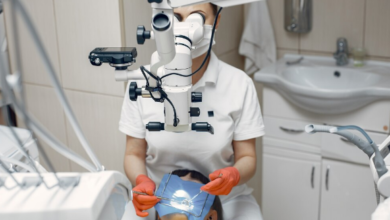Finding the Right Emergency Dentist in Edmonton: Your Guide to 24/7 Care

Understanding Emergency Dental Services
When a dental issue arises unexpectedly, knowing where to turn is crucial. This section will guide you through what qualifies as emergency dental services, helping you recognize when immediate care is needed and what treatments an emergency dentist in Edmonton can provide to address the situation promptly.
Types of Dental Emergencies
So, what exactly counts as a dental emergency? It’s more than just a toothache. Here’s a breakdown:
- Severe, Unrelenting Pain: If you’ve got pain that won’t quit, and over-the-counter stuff isn’t helping, that’s a red flag.
- Knocked-Out Tooth: Time is of the essence here. The sooner you get to a dentist, the better the chance of saving the tooth.
- Broken or Cracked Tooth: Depending on the severity, this can lead to infection or further damage if not addressed quickly.
- Abscess: This is a serious infection that needs immediate attention to prevent it from spreading.
- Excessive Bleeding: Bleeding that won’t stop after applying pressure for a reasonable amount of time needs professional evaluation.
When to Seek Immediate Care
Knowing when to rush to the dentist can save you a lot of pain and potential complications. Don’t delay if:
- You’re experiencing uncontrolled bleeding in your mouth.
- You have severe pain that’s interfering with your ability to function.
- You’ve suffered a trauma to the face or mouth.
- You notice sudden swelling in your mouth or face.
- You’ve lost a filling or crown and are experiencing significant discomfort.
Ignoring a dental emergency can lead to bigger problems down the road. Infections can spread, pain can worsen, and treatment can become more complex and expensive. It’s always better to err on the side of caution and seek professional help when in doubt.
Common Treatments Offered
Emergency dentists are equipped to handle a range of issues. Here are some common treatments you might encounter:
- Pain Management: This is usually the priority, using local anesthetics or other pain relievers.
- Tooth Extractions: If a tooth is beyond saving, extraction might be necessary.
- Root Canal Therapy: To treat infected teeth and save them from extraction.
- Repair of Broken or Chipped Teeth: Fillings, crowns, or bonding can be used to restore damaged teeth.
- Treatment of Infections: Antibiotics and drainage may be necessary to address abscesses or other infections.
Choosing the Right Emergency Dentist in Edmonton
Finding the right emergency dentist can feel overwhelming, especially when you’re in pain. It’s important to consider several factors to ensure you receive the best possible care. Think about what matters most to you: Is it location, availability, or perhaps a dentist who also specializes in family dentistry in Edmonton? Taking the time to research your options can make a big difference in your experience.
Factors to Consider
When choosing an emergency dentist, think about these points:
- Location: Is the dentist’s office conveniently located near your home or work? In an emergency, a short travel time can be crucial.
- Availability: Does the dentist offer after-hours or weekend appointments? A true emergency service should be available when you need it most.
- Services Offered: Does the dentist provide a full range of emergency services, from pain relief to complex procedures?
- Technology: Does the clinic use modern technology for diagnosis and treatment? Advanced equipment can lead to more accurate and efficient care.
Importance of Qualifications
It’s important to check the dentist’s qualifications and experience. Look for:
- Education and Training: Where did the dentist receive their training? Do they have any specialized certifications?
- Experience: How long has the dentist been practicing? Experience can be a valuable asset in handling emergencies.
- Professional Affiliations: Is the dentist a member of any professional organizations? This can indicate a commitment to ongoing learning and professional standards.
Patient Reviews and Testimonials
Patient reviews can provide valuable insights into the dentist’s quality of care and patient satisfaction. Consider these points:
- Read Reviews Carefully: Look for patterns in the reviews. Do patients consistently praise the dentist’s bedside manner or the clinic’s efficiency?
- Check Multiple Sources: Don’t rely on just one website for reviews. Check Google, Yelp, and other review platforms for a more complete picture.
- Consider the Source: Be aware that some reviews may be biased or fake. Look for reviews that seem genuine and provide specific details about the patient’s experience.
Choosing an emergency dentist isn’t just about finding someone who can fix your immediate problem. It’s about finding a healthcare provider you can trust and who will provide you with the best possible care during a stressful time. Take your time, do your research, and don’t be afraid to ask questions. Your oral health is worth it.
Availability and Accessibility of Care
When you’re dealing with a dental emergency, knowing that care is readily available can make all the difference. This section focuses on the availability and how easily you can access emergency dental services in Edmonton.
24/7 Emergency Services
Finding a dentist who’s available around the clock is super important. You never know when a dental emergency will strike, and waiting until morning might not be an option. Here’s what to look for:
- Clinics that advertise 24/7 availability should have a system in place to handle calls and appointments at any hour. This might involve an on-call dentist or a partnership with an emergency service.
- Confirm if the dentist provides actual treatment at all hours or just consultation and pain management until regular hours. Some places only offer advice over the phone during off-peak times.
- Ask about the dentist’s response time. How quickly can you expect to be seen if you call in the middle of the night?
Walk-in Appointments
Walk-in appointments can be a lifesaver when you don’t have time to schedule something in advance. But there are a few things to keep in mind:
- Not all emergency dental clinics accept walk-ins. It’s always a good idea to call ahead to confirm their policy.
- Even if a clinic accepts walk-ins, be prepared for a potential wait. Emergency cases are usually prioritized, so you might have to wait your turn.
- Find out if there are specific hours for walk-in appointments. Some clinics might only offer them during certain times of the day.
Location Benefits
Having a dental clinic nearby can significantly reduce stress during an emergency. Here’s why location matters:
- A conveniently located clinic saves you travel time, which is especially important when you’re in pain.
- Familiarize yourself with the locations of emergency dentists near your home or workplace. Knowing where to go in advance can save precious minutes.
- Consider clinics that have multiple locations across Edmonton. This increases the chances of finding one that’s easily accessible, no matter where you are when the emergency occurs.
It’s easy to underestimate the importance of accessibility until you’re facing a dental crisis. Knowing that a qualified dentist is available and within reach can provide immense peace of mind. Take the time to research your options and plan, so you’re prepared if the unexpected happens.
What to Expect During Your Visit
So, you’ve found an emergency dentist in Edmonton and booked an appointment. What happens next? Knowing what to expect can ease your anxiety. This section breaks down the typical steps of an emergency dental visit, so you’re prepared and can focus on getting relief.
Initial Assessment Process
First things first, the dentist will need to figure out what’s going on. Here’s what usually happens:
- Quick Paperwork: Expect some basic forms about your medical history and insurance. It’s pretty standard.
- Chat with the Dentist: They’ll ask about your pain, when it started, and anything that might be related. Be as detailed as possible.
- Exam Time: The dentist will take a look at your mouth, checking for swelling, damage, and any obvious problems. They might poke around a bit to see where it hurts the most.
- X-rays (Maybe): Depending on the issue, they might need X-rays to see what’s happening below the surface. This helps them get a clearer picture.
Treatment Options Explained
Once they know what’s up, the dentist will explain your options. Don’t be afraid to ask questions! Here are some common treatments you might encounter:
- Pain Relief: This is usually the priority. They might give you a local anesthetic to numb the area before doing anything else.
- Fillings or Crowns: If you have a cavity or a broken tooth, they might fix it with a filling or a crown.
- Root Canal: If the pulp inside your tooth is infected, you might need a root canal to clean it out and save the tooth.
- Extraction: In some cases, the tooth might be too damaged to save, and they’ll need to pull it. This is usually a last resort.
Post-Treatment Care
After the treatment, it’s important to follow the dentist’s instructions to heal properly. Here’s what to keep in mind:
- Medication: They might prescribe pain relievers or antibiotics. Take them as directed.
- Diet: Stick to soft foods for a few days, especially if you had an extraction.
- Hygiene: Gently brush and floss around the treated area. Avoid anything too vigorous.
- Follow-up: You might need to come back for a check-up to make sure everything is healing well.
It’s normal to feel a bit anxious about emergency dental work. Remember, dentists are there to help. Don’t hesitate to voice your concerns or ask for clarification on anything you don’t understand. The goal is to get you out of pain and back to smiling!
Preventing Dental Emergencies
It’s way better to avoid a dental emergency than to scramble to find care when one hits. A little effort every day can save you a lot of pain and money down the road. Think of it like this: a small investment in prevention is way better than a huge bill for emergency work. Let’s talk about how to keep those pearly whites safe and sound.
Regular Dental Check-ups
Going to the dentist regularly is super important. I know, nobody loves going, but it’s worth it. Here’s why:
- Early Detection: Dentists can spot problems early, like tiny cavities or gum issues, before they turn into big, painful emergencies.
- Professional Cleaning: They get rid of plaque and tartar that your toothbrush can’t reach, which helps prevent decay and gum disease.
- Personalized Advice: Your dentist can give you tips specific to your teeth and habits, helping you improve your oral health.
Oral Hygiene Practices
Brushing and flossing are your first line of defense. Seriously, don’t skip them!
- Brush Twice a Day: Use fluoride toothpaste and brush for at least two minutes each time. Get all the surfaces of your teeth.
- Floss Daily: Flossing gets between your teeth where your toothbrush can’t reach. Do it every day, even when you’re tired.
- Mouthwash: Using an antiseptic mouthwash can help kill bacteria and freshen your breath. It’s a good addition to your routine.
Emergency Preparedness Tips
Even with the best care, accidents can happen. Being prepared can make a big difference.
- Know Your Dentist’s Number: Keep your dentist’s contact info handy, including after-hours numbers if they have them.
- First-Aid Kit: Have a small dental first-aid kit with things like gauze, pain relievers, and temporary filling material (available at most drugstores).
- Act Fast: If you do have a dental emergency, don’t wait. Call your dentist right away. The sooner you get treatment, the better.
Taking care of your teeth every day is the best way to avoid needing emergency dental care. It’s about building good habits and being prepared for the unexpected. A little prevention goes a long way.
Cost Considerations for Emergency Dental Care
When a dental emergency strikes, the last thing you want to worry about is the financial burden. But let’s be real, understanding the cost involved is important. Here’s a breakdown to help you navigate the expenses associated with urgent dental treatment.
Insurance Coverage
Navigating dental insurance can feel like a root canal sometimes, but it’s worth understanding what your plan covers. Here’s what to keep in mind:
- Check your policy: Don’t just assume you’re covered. Read the fine print or call your insurance provider to understand the specifics of your emergency dental coverage.
- Waiting periods: Some plans have waiting periods before certain procedures are covered, so be aware of those limitations.
- Deductibles and co-pays: Know what your out-of-pocket expenses will be before treatment begins. Ask the dentist’s office to help you estimate these costs.
It’s a good idea to contact your insurance company before your emergency visit. They can give you the most accurate information about your coverage and what you can expect to pay.
Payment Plans Available
Not everyone has dental insurance, and even those who do might face unexpected costs. Luckily, many dental offices offer payment plans to make emergency care more accessible:
- In-house plans: Some dentists offer their payment plans, allowing you to spread out the cost of treatment over time.
- Third-party financing: Companies like CareCredit specialize in healthcare financing and can provide loans or credit lines for dental work.
- Discuss options: Don’t be afraid to talk to the dental office about your financial situation. They may be able to work with you to find a solution that fits your budget.
Understanding fees
Transparency is key when it comes to dental fees. Here’s what you should expect:
- Detailed estimates: Before any treatment begins, ask for a written estimate of all costs involved. This should include the cost of the exam, X-rays, and any procedures.
- Ask questions: Don’t hesitate to ask the dentist or office staff to explain any charges you don’t understand. It’s your right to know what you’re paying for.
- Compare prices: If possible, call around to different dental offices to compare prices for common emergency procedures. However, keep in mind that quality and experience are also important factors to consider.
Emergency Dental Care for Children
Kids get dental emergencies, too, and it can be super stressful for both them and you! Knowing what to do and where to go can make a huge difference. This section is all about emergency dental care for children, focusing on common issues, finding the right dentist, and some helpful tips for parents.
Common Pediatric Dental Emergencies
Kids are active, and sometimes their teeth pay the price. Here are some common dental emergencies we see in children:
- Knocked-out teeth: This is a big one, especially for kids playing sports or just being kids. Time is of the essence to try and save the tooth.
- Chipped or broken teeth: Falls and accidents happen. Even a small chip can cause pain and sensitivity.
- Severe toothache: Could be a sign of decay, infection, or something else going on. Don’t ignore a child’s complaints of tooth pain.
- Abscesses: These are infections that can be serious and need immediate attention.
- Objects stuck between teeth: Sometimes, flossing just doesn’t cut it, and you need a professional to safely remove the object.
Finding a Child-Friendly Dentist
Not all dentists are great with kids. Finding one who is patient, understanding, and knows how to talk to children can make the experience much better. Look for these qualities:
- Experience with children: Pediatric dentists specialize in treating children’s dental needs.
- A welcoming office environment: A kid-friendly waiting room and treatment area can help ease anxiety.
- Good communication skills: The dentist should be able to explain things to both you and your child in a way you both understand.
- Positive reviews: Check online reviews to see what other parents have to say about their experiences.
Tips for Parents
Being prepared can make a dental emergency less scary. Here are some tips for parents:
- Stay calm: Your child will pick up on your anxiety, so try to remain calm and reassuring.
- Have a plan: Know where to go for emergency dental care and have the contact information readily available.
- Keep a dental first-aid kit: Include items like gauze, pain relievers, and a small container for a knocked-out tooth.
- Teach good oral hygiene: Prevention is key! Make sure your child brushes and flosses regularly.
Dealing with a dental emergency is never fun, especially when it involves your child. Remember to stay calm, act quickly, and find a dentist who is experienced in treating children. With the right care, you can help your child get back to smiling in no time.





